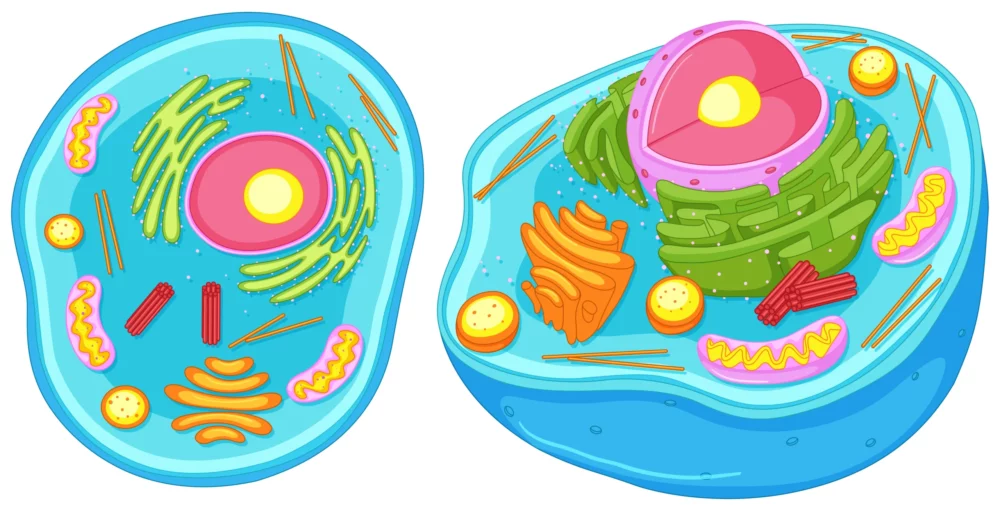Category: Q & A

General Q&A part-6
State two features of the gas exchange surface in humans? The gas exchange surface in humans primarily refers to the respiratory system, where the exchange of oxygen and carbon dioxide takes place. Two essential features of the gas exchange surface in humans are: Large Surface Area: The gas exchange surface in humans, which includes the…

Q&A on Kingdom Monera
Q: What is Kingdom Monera? A: Kingdom Monera is one of the five biological kingdoms, encompassing prokaryotic microorganisms, which include bacteria and archaea. Q: What defines prokaryotic microorganisms in Kingdom Monera? A: Prokaryotic cells in Kingdom Monera lack a true nucleus and membrane-bound organelles, and they typically possess a singular circular chromosome. Q: How do…

Q&A on plant kingdom
The world of plants is a rich and diverse one, with countless species that span the globe, from the tallest trees to the tiniest mosses. Understanding the plant kingdom is not only fascinating but also essential to our understanding of the natural world. In this Q&A on the plant kingdom, we will delve into the…

General Q&A part-5
What are the stages involved in PCR, and on what does PCR depend? Polymerase Chain Reaction (PCR) is a widely used molecular biology technique for amplifying specific DNA sequences. PCR involves several stages, and it depends on various components and conditions for successful amplification. Here are the main stages of PCR and what PCR depends…

Q&A on Glycolysis
1. What is glycolysis, and why is it important? Glycolysis is a metabolic pathway that breaks down glucose into energy-rich molecules. It’s crucial for energy production in cells. 2. Where does glycolysis occur in cells? Glycolysis takes place in the cytoplasm of cells. 3. How many ATP molecules are initially invested in glycolysis? Two ATP…

Q&A on Cell organelles
Q: What are cell organelles? A: Cell organelles are specialized structures within a cell that perform specific functions. They are often referred to as the “organs” of a cell because they carry out various tasks necessary for the cell’s survival and function. Q: What is the function of the cell membrane? A: The cell membrane,…

General Biology MCQs
Here are some biology MCQs. 1. Which organelle is responsible for photosynthesis in plant cells? a) Mitochondria b) Nucleus c) Chloroplasts d) Endoplasmic reticulum Answer: c) Chloroplasts Explanation: Chloroplasts are the organelles responsible for photosynthesis, where plants convert sunlight into chemical energy in the form of glucose. 2. Which of the following is NOT a…

General Q&A part-4
What is oncology? Oncology is the branch of medicine that specializes in the study, diagnosis, treatment, and research of cancer. Cancer is a complex group of diseases characterized by the uncontrolled growth and spread of abnormal cells in the body. Oncologists are medical professionals who are trained to diagnose and treat various types of cancer,…

Q&A on Cell Structure
Let’s discuss some Q&A on cell structure. Q1: What is the basic structural and functional unit of all living organisms? A1: The basic structural and functional unit of all living organisms is the cell. Q2: What is the main function of the cell membrane? A2: The cell membrane regulates the passage of substances in and…

General Q&A part-2
This page contains general Q&A questions asked by curious people. What is biochemistry? Biochemistry is a branch of science that combines principles from both biology and chemistry to study the chemical processes and substances that occur within living organisms. It focuses on understanding the molecular mechanisms that underlie various biological functions and processes, including metabolism,…

General Q&A part-1
This page contains general Q&A questions asked by curious people. How many types of Air pollution? Air pollution can be categorized into several types based on the sources of pollutants, the nature of the pollutants, and their effects on the environment and human health. The main types of air pollution include: Particulate Matter (PM): Particulate…

Q&A on plant structure and function
Q: What is the primary function of plant leaves? A: The primary function of plant leaves is to perform photosynthesis, where they convert sunlight, carbon dioxide, and water into glucose and oxygen. Additionally, leaves also facilitate gas exchange and transpiration. Q: How do plant roots contribute to the overall health of a plant? A: Plant…



